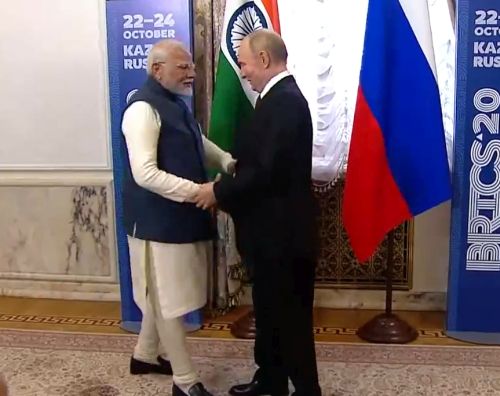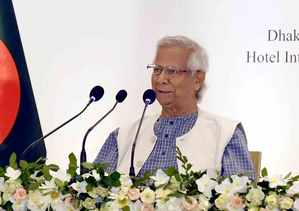International
US 'deliberately' excluded then South Korean Prez Moon Jae-in from 2018 Trump-Kim summit: Ex-official
Washington, May 10 (IANS) The US “deliberately” excluded then-South Korean President Moon Jae-in from its first-ever summit with North Korea in Singapore in 2018 as he was “too willing” to make concessions, a State Department spokesperson during the former Trump administration said in a book published this week.
Morgan Ortagus, the department’s spokesperson from 2019-2021, described the exclusion from the meeting between then President Donald Trump and North Korean leader Kim Jong-un as an “America first foreign policy in action,” stressing that though the US works with allies, it will sometimes move “independently” when it serves America’s interests, Yonhap news agency reported.
She wrote a chapter in the book titled “An America First Approach to US National Security.” It was published by the America First Policy Institute (AFPI), a non-profit organisation. Her chapter was titled “America First, NATO, and US Alliances: Why America First is Not Isolationism.”
“The United States also deliberately excluded Moon from the Singapore summit because he was too willing to make concessions to North Korea,” she wrote.
“This is an America-first foreign policy in action: American strength, presidential leadership, peace through strength, and working with allies with the caveat that the United States will sometimes act independently when it is in our nation’s interest,” she added.
The Singapore summit took place in June 2018, producing an agreement under which Pyongyang committed to work toward the “complete denuclearisation” of the Korean Peninsula, while both sides agreed to work together to build new relations and foster a lasting, stable peace regime on the peninsula.
Ortagus noted that the US “listened to” Moon but took a much harder line against Pyongyang than Moon wanted.
“Although the United States worked closely with Japan and South Korea in its approach to North Korea, the Trump administration did not give either state a veto over America’s North Korea policy,” she said.
She portrayed Trump’s personal diplomacy with the North Korean leader as a “case study” of how an America-first foreign policy can work.
In particular, she recalled Trump’s UN address in 2017, in which he said that the US has great strength and patience, but if forced to defend itself and its allies, it would have no choice but to “totally destroy” North Korea.
“Trump’s tough rhetoric, sanctions, and policies against North Korea in 2017 led Kim to agree to diplomacy with the United States, including a summit with the president in Singapore in June 2018,” she said.
She took a swipe at President Joe Biden’s foreign policy, saying his administration has continued along a “dangerous” path.
“North Korea’s significant expansion of its missile program since 2021, along with possible preparations for a seventh underground nuclear test, has seen no real policy response from the Biden administration,” she said.
“This has been driven by the president naming a part-time North Korean special envoy and a failure of top Biden officials to attempt bilateral diplomacy with their North Korean counterparts.”
Calling Biden’s Asia foreign policy “weak,” she said it has led to joint naval and air exercises between Russia and China and a “new Russia-China axis that has been augmented by North Korea and Iran.”
Ortagus touched on South Korean President Yoon Suk Yeol’s move to cope with evolving North Korean threats while pointing to Yoon’s past comment hinting at the possibility of South Korea exploring its own nuclear option.
“Yoon’s comments caused panic in Biden’s national security team and led to a crash program to repair US relations with South Korea and Japan, culminating with the Biden-Yoon summit and the Camp David summit,” she said.
The Camp David summit refers to a landmark trilateral meeting between Yoon, Biden and Japanese Prime Minister Fumio Kishida at the presidential retreat in Maryland in August. It produced a series of agreements, including the “Commitment to Consult” each other in the event of a shared threat.
“Although Biden deserves credit for these efforts, it is fair to say the meetings were a response to his administration’s neglect toward our Asian allies and their worries about whether the United States would support them against China and North Korea,” she said.
In a chapter written by Stephen Yates and Adam Savit of the AFPI, they noted the role of the 28,500-strong US Forces in Korea in dealing with potential threats from China.
“With the Korean Peninsula frozen in conflict since 1953, nearly 30,000 US troops are stationed in the South alongside a formidable South Korean military that stands to deter the nuclear-armed North,” they wrote.
“These forces are crucial to deterring China’s likely attempts to goad Kim Jong Un’s regime into mounting a Korean front in the event of a general conflict, but this would likely leave them unable to intervene directly in the vicinity of Taiwan.”
AFPI was established in 2021 to promote Trump’s public policy agenda. It involves a series of former senior officials from the Trump administration.
–IANS
int/sd/svn
International
Lee Hsien Yang seeks refuge in United Kingdom

Lee Hsien Yang, the youngest son of Singapore’s founding father, the late Lee Kuan Yew, announced on Tuesday that he is now a political refugee in the United Kingdom after seeking asylum from the British government “as a last resort.”
“I remain a Singapore citizen and hope that someday it will be safe to return home,” Lee stated in a Facebook post, as reported by Channel News Asia (CNA).
Citing what he described as the Singapore government’s “attacks” against him, Lee, who is the younger brother of former Prime Minister Lee Hsien Loong, revealed that he sought asylum protection in 2022.
Lee Hsien Yang and his late sister, Lee Wei Ling, who passed away earlier this month, have been in conflict with their brother Lee Hsien Loong over the fate of their father’s home following his death in 2015, resulting in a public dispute that has estranged the siblings.
In an interview with the UK-based newspaper The Guardian, Lee alleged that a “campaign of persecution” compelled him to seek asylum in Britain.
In response to his claims, the Singapore government stated that there is “no basis” for his allegations of “a campaign of persecution” or other assertions regarding political repression in the country.
“Singapore’s judiciary is impartial and makes decisions independently. This is why Singaporeans have a high level of trust in the judiciary,” a government spokesperson remarked.
The spokesperson added that there are no legal restrictions preventing Lee and his wife, lawyer Lee Suet Fern, from returning to Singapore. “They are and have always been free to return to Singapore,” the spokesperson said.
Lee and his wife have been outside of Singapore since 2022, having opted not to attend a scheduled police interview regarding potential offenses related to providing false evidence in judicial proceedings concerning their father’s will and the family home.
Lee and his late sister, who had been living at the property, alleged they felt threatened while trying to fulfill their father’s wish to demolish the house. They also accused their elder brother, former Prime Minister Lee Hsien Loong, of abusing his governmental influence to advance his personal agenda.
International
Indo-Russian ties are stronger than ever before at BRICS

Kazan, Russia: Prime Minister Narendra Modi held a bilateral meeting with Russian President Vladimir Putin on the sidelines of the 16th BRICS Summit.
During the meeting, President Putin remarked, “I recall our meeting in July, where we had productive discussions on various issues. We’ve also spoken over the phone several times. I am very grateful you accepted the invitation to come to Kazan. Today, we will attend the BRICS Summit’s opening ceremony, followed by dinner.”
PM Modi responded by expressing his appreciation, saying, “I sincerely thank you for your friendship, warm welcome, and hospitality. It’s a great pleasure to visit such a beautiful city as Kazan for the BRICS Summit. India shares deep historical ties with this city, and the opening of our new embassy here will further strengthen these connections.”
International
Laos seeks to enhance nutrition amid climate change concerns

Vientiane (Laos), Aug 22 (IANS) Representatives from the Lao government and development partners have attended a conference here titled “Climate Change and Nutrition in Laos: Intersections and Interventions” to discuss the impact of climate change on nutrition in the Southeast Asia country and potential solutions.
Speaking at the conference, deputy director general of the Department of Hygiene and Health Promotion under the Lao Ministry of Health Viengkhan Phixay, said, “We gather to address a critical and interwoven issue: the impact of climate change on nutrition and how we can work together to tackle these challenges,” Xinhua news agency reported.
The Lao government is actively engaged in this endeavor, with numerous policies and initiatives aimed at addressing both climate change and nutrition, Lao National Television reported on Thursday.
“By leveraging the Scaling Up Nutrition network in Laos, which is led by the government, and supported by civil society, donors, and the United Nations, we have a robust platform to tackle the negative impacts of climate change while improving nutrition and overall health for everyone in Laos,” Viengkham said at the conference held on Monday.
The conference featured a series of presentations that not only detailed evidence-based research but also introduced innovative tools for measuring and enhancing nutrition under the impact of climate change.
The conference stressed the critical need for integrated approaches to tackle the intertwined challenges of climate change and nutrition, and setting the stage for impactful future collaborations.
–IANS
int/psd
International
One killed, seven injured in shootout in Iraq

Baghdad, Aug 22 (IANS) A civilian was killed while seven others were injured on Thursday in a tribal shootout in Iraq’s holy Shiite province of Najaf, according to a local security source.
The shootout erupted in the early hours between armed men from the local tribe in the al-Zarga area in northern Najaf, some 160 km south of Baghdad, a local police officer told Xinhua on condition of anonymity.
The clash resulted in the killing of an Iraqi civilian and the injury of seven others, including three Iranian Shiite pilgrims, the source added.
A joint force from the Interior Ministry’s emergency response division and Najaf provincial police arrested 53 gunmen from both sides of the shootout and seized weapons and ammunition, the Interior Ministry said in a statement.
It added that search operations are ongoing to locate additional gunmen and weapons, with more details to be released later.
The incident took place as numerous pilgrims traveled to the city of Karbala to observe Arbaeen, which marks the end of a 40-day mourning period for the killing of Imam Hussein, the grandson of Prophet Muhammad, in the Battle of Karbala in 680 A.D.
Typically, these pilgrims also visit Najaf as part of their journey to Karbala.
–IANS
int/jk/arm
International
Bangladesh seeks $1 billion budget support from World Bank

Dhaka, Aug 22 (IANS) Bangladesh’s interim government has sought $1 billion from the World Bank as budgetary support.
The call came from the country’s Power, Energy and Mineral Resources Adviser Muhammad Fouzul Kabir Khan’s meeting with Abdoulaye Seck, the World Bank’s Country Director for Bangladesh and Bhutan, in Dhaka on Wednesday.
He made the plea as the ministry owes more than 2 billion dollars to suppliers in import costs of power and energy, Xinhua news agency reported.
Khan mentioned that the interim government, which was formed with many pressing mandates, is due to settle a $2 billion debt left by the previous government in the power sector.
He said they have already suspended activities under the much-criticized Quick Enhancement of Electricity and Energy Supply Act 2010 and abolished the government’s power to set energy prices without any public hearing.
On August 5, the former Prime Minister of Bangladesh, Sheikh Hasina, was ousted from her country and power, ending her rule since January 2009.
This event was seen as a massive escalation, with what initially started as student’s protests and resulted in a major crisis in Bangladesh.
Earlier on August 8, Nobel laureate Muhammad Yunus took oath as the head of Bangladesh’s interim government.
–IANS
int/jk/as
-
Video2 years ago
PM Modi Attacks Congress in Karnataka with “Kerala Story”
-
Politics2 years ago
Siddaramaiah & DK Shivakumar sworn in as Chief Minister & Deputy CM respectively
-
Cricket2 years ago
CSK players rejoice 5th IPL title with their families (Pics)
-
Entertainment2 years ago
Karan Deol weds his longtime Girlfriend Drisha Acharya (Pics)
-
Sports7 years ago
History Of Official FIFA WORLD CUP Match balls
-
India2 years ago
Ashwini Vaishnaw: Railway Board recommends CBI probe in the Odisha railway disaster
-
Entertainment2 years ago
Urvashi Rautela dazzles on Cannes 2023 red carpet (Pics)
-
Entertainment2 years ago
Sunny Leone gets ready for Kennedy premiere in Cannes (Pics)






























